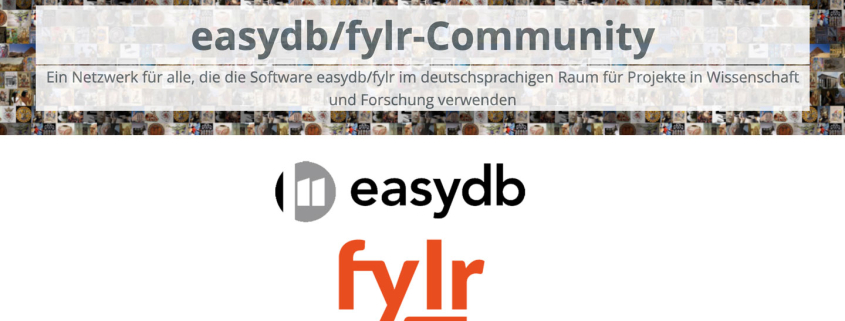The 2nd network meeting of the easydb / fylr community
The second network meeting of the easydb / fylr community took place on February 13, 2024 with a total of 46 participants.
greeting
The opening was by Dr. Maria Effinger from the University Library (UB) Heidelberg / arthistoricum.net / NFDI4Culture and Frank Dührkohp from the GBV network headquarters (VZG), with reference to the arthistoricum.net , where all Info is brought together.
3D Working Group Report
Leonhard Maylein from Heidelberg University Library, Dr. Hubert Mara from Martin Luther University (MLU) Halle-Wittenberg and Patrick Dinger from the University and State Library of Münster presented the progress in the development of a 3D viewer plugin for easydb , which currently supports the Graphic Language Transmission Format (glTF) and the associated binary format (GLB) as well as the Polygon File Format (ply) and Nexus formats are supported. There are also considerations to also integrate the formats of the Reflectance Transformation Imaging (RTI) class. These formats can be transferred into a format for which JavaScript-based viewers already exist. However, these consist of several files. Here you will probably have to resort to the recently introduced extension of the easydb , which means that with zip folders you can also access the individual files via the asset server (with the disadvantage that the easydb only sees these assets as “zip files” and not as 3D format. The plugin and further Info be found on GitHub
Switching to fylr
Frank Dührkohp, head of the VZG's digital library, reported on the test phase for productive systems such as DANTE (data hub for normative data and terminologies). DANTE is a central vocabulary server that is operated by the GBV network headquarters to maintain and centrally make available terminologies, vocabularies, authority data and lists for various data collection databases.
Furthermore, the challenges of switching the cultural studies database Kuniweb to fylr discussed. This is particularly due to the new data model, which is now LIDO- oriented. LIDO (Lightweight Info Describing Objects Version 1.1.) is an XML harvesting schema for providing metadata about material culture objects to a variety of online services and supports multilingual environments, based on improved versions of existing data schemas. He referred to the LIDO “light data model” as a minimum data set recommendation for museums and collections .
Report from Programmfabrik
Sebastian Klarmann , Commercial Director of Programmfabrik , info about the latest version of their software, fylr , which is a further development of easydb 5. The improvements include better performance, a new technical foundation dam programming the backend in Go ), support for advanced storage options (e.g. S3 or Ceph ) and image standards, improved interfaces for data exchange (e.g. IIIF) and a new design . A mobile app for iOS and Android has already been developed and is waiting to be made available in the Apple app stores and the Google Play Store. fylr is compatible with the previous version and offers the display of geographical data as Search results on maps.
Exchange to easydb / fylr as a historical research database
Nils Weiher from Heidelberg University University presented a project entitled “ Medieval Maritime Predation: A Database Support Analysis of Mediterranean Violence ,” which analyzes violence in the Mediterranean during the Middle Ages. For this project there is an additional software tool (plugin) from the Scientific Software Center (SSC) at Heidelberg University for linking easydb objects with literature references in Zotero. available on the GitHub The way in which data is organized in a project from Münster was also discussed. The results of this project (DOI) 10.5281 are published online on zenodo and can be found 7715365
various
- The community page is linked to arthistoricum.net , where you can also find Info easydb / fylr community. All participants are encouraged to participate in maintaining the community page.
- Programmfabrik is organizing the next easydb / fylr developer meeting as a face-to-face event. Late summer/autumn 2024 is planned for this in Berlin.
- Dr. Martin Engel from the Institute for Art History in Vienna reported on the merger of various art history institutes from universities in Basel, Berlin (FU), Bern, Halle, Hamburg, Jena, Marburg and Zurich in the connector network. The connector enables several easydb and fylr systems to be linked. There is a mailing list for the easydb connector-verbund@ programmfabrik .de .
- Programmfabrik team is currently on the fylr documentation . Some content is already available.
The virtual meeting of the easydb / fylr community provided a good platform for exchange and discussion about the latest developments and future plans of the community. We at Programmfabrik would like to thank everyone present for their input and look forward to future community activities.
Be sure search easydb and fylr websites to gain deeper insights into the functionalities and benefits of our solutions.



